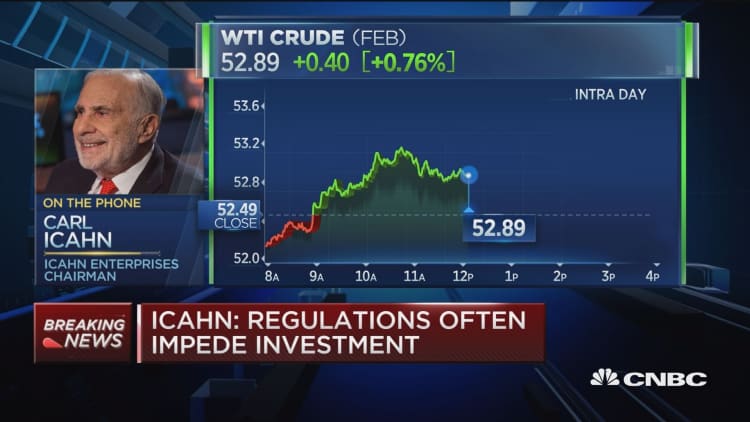
Carl Icahn told CNBC on Thursday it's "crazy" to say he should sell his holdings to avoid the appearance of conflicts of interest while serving as an adviser to President-elect Donald Trump.
Trump on Wednesday named the billionaire activist investor, a frequent critic of some Obama administration rules and a major fossil fuel investor, a special advisor on regulation. Critics say Icahn could use the role to craft regulatory policies that would help his companies and benefit him personally.
The president-elect's transition team said in a statement that the activist investor will aid him in an "individual capacity" rather than as a federal employee or special government employee, adding that he will not have "specific duties." He therefore likely will not have to give up his varied business interests while advising Trump on policy.
Icahn, 80, claimed Thursday that saying he should not advise Trump is akin to saying that JPMorgan Chase CEO Jamie Dimon should not talk to Trump about financial issues due to his stake in the bank.
"It's almost ridiculous to say, I'm going to give my opinion to Donald, but I shouldn't own stocks. It's like, to me, crazy," Icahn told CNBC's "Fast Money: Halftime Report."
Icahn said his role should not matter because he does not make the policy. Yet, reports suggest that he has already aided Trump in choosing a Cabinet member who will make rules that heavily affect Icahn.
Icahn helped Trump to pick Oklahoma Attorney General Scott Pruitt as head of the Environmental Protection Agency, according to Dow Jones. Icahn will also help to choose the next chairman of the Securities and Exchange Commission, the report said.
Icahn has frequently criticized Obama administration energy restrictions and told CNBC that he supported Trump's choice of Pruitt, who has battled the current president's EPA and expressed doubts about how much humans affect climate change. Icahn previously said the EPA was one of the worst-run agencies he had ever seen.
The activist investor is known for challenging companies to make changes that he believes will boost their share prices. Icahn's holdings include CVR Energy, Cheniere Energy and insurance giant AIG, which could all be helped by Trump's anti-regulatory agenda.
Trump transition spokesman Jason Miller told reporters Thursday that the administration will make sure "proper oversights" are in place around Icahn's role. He did not specify what those would be.
Icahn also defended his reported role in choosing the SEC chairman. He rebutted comments from a securities lawyer quoted by USA Today, who said Icahn's role is "a little like asking the fox to guard the hen house."
"I don't even understand the statement because I just look at my record ... where we made hundreds of billions of dollars for shareholders," Icahn said. "Now you're going to say that my being involved in asking for more accountability or thinking this country should have it and my being involved is going to hurt. I just don't understand the criticism."
Icahn added that he is "not against regulations at all" but wants to get rid of what he called "absurd" rules. The investor pointed to EPA rules about refineries, which he has a significant financial interest in.
Trump's transition team will need to provide more information on Icahn's role to clarify whether conflict of interest rules will apply to him, said Norman Eisen, a former ambassador to the Czech Republic and ethics advisor to Obama. He said that, because of Icahn's title and his described role in helping to choose appointees, he seems to be a de facto special government employee, which would make him subject to rules against using the position to help himself financially.
Trump's team said in a statement that Icahn is not a special government employee, but that does not make it true, Eisen said.
Eisen added that Icahn's relatively undefined role is dangerous because it would become easier to abuse it if no clear rules are in place.
UPDATED: This story was updated to include comments from Norman Eisen.


